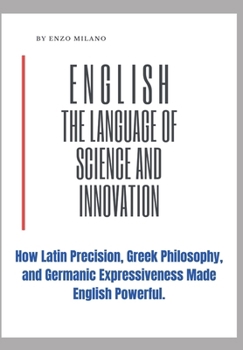English: The Language of Science and Innovation: How Latin Precision, Greek Philosophy, and Germanic Expressiveness Made Englis
"English: The Language of Science and Innovation" explores the history and development of the English language, highlighting its unique blend of Latin, Greek, and Germanic influences. The book examines how these diverse linguistic traditions converged to create a language that is both precise and expressive, making it an ideal medium for scientific, philosophical, and technological discourse. The book discusses how English absorbed elements from other languages, such as Latin, Greek, and French, during periods of cultural diffusion and political change in Europe. It also explores how the language evolved to accommodate new ideas and concepts during the Renaissance and the Enlightenment, cementing its status as a global lingua franca. The book is divided into 18 chapters, each focusing on a different aspect of the English language's development and its impact on various fields, such as science, philosophy, technology, and innovation. The chapters examine how English became a catalyst for intellectual exchange across cultures and disciplines, facilitating the synthesis of ideas and the creation of new knowledge. The book also explores the cognitive and neural basis of language and how English's unique blend of influences has shaped its grammatical structure, vocabulary, and idiomatic expressions. It discusses how the language's ability to absorb foreign elements and adapt to changing paradigms has allowed it to remain a flexible and powerful tool for communication and innovation. The book explores the history and development of the English language, with a focus on how it has become the dominant language of science, technology, and innovation. Some of the topics include the history of the English language, the influence of Latin and Greek on its development, the role of the British Empire in spreading English around the world, and the impact of technology on the language. One of the main arguments of the book is that the English language has become a powerful tool for scientific and technological communication because of its ability to absorb and adapt to new ideas and concepts. The author argues that this adaptability is due to the language's unique grammatical structure and vocabulary, which allow it to easily incorporate new words and expressions. The book also explores the cognitive and neural basis of language, and how the English language's structure and vocabulary have evolved over time to meet the needs of its speakers. The author discusses how the language's ability to adapt to changing paradigms has allowed it to remain a flexible and powerful tool for communication and innovation. "English: The Language of Science and Innovation" provides a comprehensive and detailed analysis of the English language's development and its impact on various fields. It is a fascinating read for anyone interested in language, science, technology, and innovation.keywords:
English language for science and technology
History of English language in science
Evolution of English for scientific communication
Impact of English on scientific progress
Linguistic influences on scientific language
Global language of science and innovation
English as a lingua franca for science
English language and technological innovation
Cognitive and neural basis of scientific language
English language adaptability and innovation English language development for scientific discourse
Role of English in scientific knowledge synthesis
English language as a tool for science and technology
Linguistic analysis of scientific English
English language and the evolution of science
Linguistic factors influencing scientific communication
English language and technological advancements
Neural underpinnings of scientific language comprehension
English language's role in shaping scientific ideas
English language for science and technology
History of English language in science
Evolution of English for scientific communication
Impact of English on scientific progress
Linguistic influences on scientific language
Global language of science and innovation
English as a lingua franca for science
English language and technological innovation
Cognitive and neural basis of scientific language
English language adaptability and innovation English language development for scientific discourse
Role of English in scientific knowledge synthesis
English language as a tool for science and technology
Linguistic analysis of scientific English
English language and the evolution of science
Linguistic factors influencing scientific communication
English language and technological advancements
Neural underpinnings of scientific language comprehension
English language's role in shaping scientific ideas
Format:Paperback
Language:English
ISBN:B0CPHNDBXG
ISBN13:9798870767826
Release Date:December 2023
Publisher:Independently Published
Length:172 Pages
Weight:0.62 lbs.
Dimensions:0.4" x 6.7" x 9.6"
Customer Reviews
0 rating





